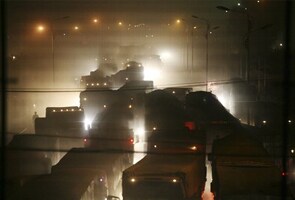
Los Angeles:
Two cities notorious for their choked roads are teaming up to share ideas on how to better manage traffic.
A Los Angeles County Metropolitan Transportation Authority executive says he is working on an agreement with his counterpart in Beijing that will lead to an exchange of technical expertise and joint research projects.
While the notion of the car capital of the world teaching China's capital how to handle traffic seems far fetched, experts say the two cities can benefit from the partnership.
"Clearly there are things to learn on both ends," said Randall Crane, an urban planning professor at the University of California, Los Angeles who's working on a book about Chinese urbanisation.
"Beijing planners are desperately trying to adjust to an increasingly car-oriented world, where people don't live where they work. At the same time, LA wishes it had as good of a transit infrastructure and as many people wanting to take transit."
Beijing, which went from having almost no private cars 15 years ago to having vehicles snarl to a crawl for most of the day, wants to know how Los Angeles copes with such problems.
Meanwhile, Los Angeles can benefit from learning about Beijing's speedy expansion of its rail transit system, said Paul Taylor, deputy chief executive officer of the MTA.
"They're experiencing the same problems we've gone through in a much more accelerated way," Taylor said. "They know we have more cars than anywhere else in the US and probably on a per capita basis more than anywhere in the world, and they'd like to know how we deal with that."
A Los Angeles County Metropolitan Transportation Authority executive says he is working on an agreement with his counterpart in Beijing that will lead to an exchange of technical expertise and joint research projects.
While the notion of the car capital of the world teaching China's capital how to handle traffic seems far fetched, experts say the two cities can benefit from the partnership.
"Clearly there are things to learn on both ends," said Randall Crane, an urban planning professor at the University of California, Los Angeles who's working on a book about Chinese urbanisation.
"Beijing planners are desperately trying to adjust to an increasingly car-oriented world, where people don't live where they work. At the same time, LA wishes it had as good of a transit infrastructure and as many people wanting to take transit."
Beijing, which went from having almost no private cars 15 years ago to having vehicles snarl to a crawl for most of the day, wants to know how Los Angeles copes with such problems.
Meanwhile, Los Angeles can benefit from learning about Beijing's speedy expansion of its rail transit system, said Paul Taylor, deputy chief executive officer of the MTA.
"They're experiencing the same problems we've gone through in a much more accelerated way," Taylor said. "They know we have more cars than anywhere else in the US and probably on a per capita basis more than anywhere in the world, and they'd like to know how we deal with that."
Track Latest News Live on NDTV.com and get news updates from India and around the world

